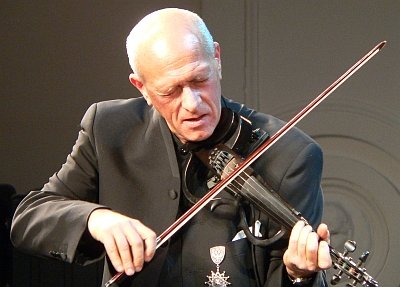Who will protect the music?
 The author of the article “The Age of Electronic Music” believes that the music for acoustic instruments, the highest achievement of which he considers symphonic music, is in the past. The future belongs to electronic music, which he asks not to be confused with “pop music”, in which electronic instruments are used “primitively”. He calls such music applied music and considers it unworthy – this is simply “low-grade pseudo-electronic opuses.” A lot of words were told to them about the “poverty of colors” even of a symphony orchestra, whose “color arsenal” “does not exceed two dozen timbres” (the counting accuracy is amazing!). A. Enfi considers timbre “the most important formative function” and believes that “timbre deficit limits the compositional possibilities of academic symphony.” He rightly argues that “the need to enrich the timbre palette was acutely felt throughout the era of the symphony orchestra.” And then from this indisputable premise a very controversial conclusion is made: “as a result of the crisis of timbre, which began in academic music, the resource of its compositional capabilities began to be quickly developed.” The reader remembers that A. Enfi took the quotation from B. Asafiev as an epigraph to his article – in this connection, it is interesting that the academician himself spoke about the intonational crisis of modern music, and not about the timbre at all. The difference in significance for the musical art of intonation and timbre is obvious, as well as the absolute priority of intonation over timbre – with all due respect to him …
The author of the article “The Age of Electronic Music” believes that the music for acoustic instruments, the highest achievement of which he considers symphonic music, is in the past. The future belongs to electronic music, which he asks not to be confused with “pop music”, in which electronic instruments are used “primitively”. He calls such music applied music and considers it unworthy – this is simply “low-grade pseudo-electronic opuses.” A lot of words were told to them about the “poverty of colors” even of a symphony orchestra, whose “color arsenal” “does not exceed two dozen timbres” (the counting accuracy is amazing!). A. Enfi considers timbre “the most important formative function” and believes that “timbre deficit limits the compositional possibilities of academic symphony.” He rightly argues that “the need to enrich the timbre palette was acutely felt throughout the era of the symphony orchestra.” And then from this indisputable premise a very controversial conclusion is made: “as a result of the crisis of timbre, which began in academic music, the resource of its compositional capabilities began to be quickly developed.” The reader remembers that A. Enfi took the quotation from B. Asafiev as an epigraph to his article – in this connection, it is interesting that the academician himself spoke about the intonational crisis of modern music, and not about the timbre at all. The difference in significance for the musical art of intonation and timbre is obvious, as well as the absolute priority of intonation over timbre – with all due respect to him …
However, as the article “The Age of Electronic Music” is read, the surprise grows, for the picture of the modern music world drawn by its author looks like the dying of the “old acoustic” music and the onset of the triumph of the “new electronic”, which is only hampered by the unpleasant “low-grade pops” … Agree too narrow, obviously “something is missing in the soup” … The question arises – where is all the vocal music, from opera and choirs to romances and songs? After all, this is a huge layer of world music culture! Where is jazz in all its diversity? Has he died too, along with symphonic music? Moreover – and where, strictly speaking, rock? Whether he was referred to “low-grade pops” (in this case admires the author’s courage, because the rockers are harsh people), or to “real electronic” music, then the author’s musical competence, fully demonstrated in the article as a whole, is already in doubt …
No, of course, the author of the article knows about the existence of these kinds of music – it’s just that existence doesn’t fit into his concept. And the essence of it – that’s what:
Synthesizers – above acoustic instruments (“for the variety of performance techniques and the subtlety of musical nuances, that is, for the expressiveness of sound, hundreds of controllers in electronic music are responsible for providing synthesizers superiority over acoustic instruments”).
Electronic music is higher than acoustic (“synthesizer performance more fully implements such fundamental creative principles as technical freedom and inspirational imagination”).
The sound created with the help of computer programs, better performed by musicians (“the traditional European notation system is unable to reflect all the incredible amount of degrees of freedom of electronic steering with sound”).
At the same time A. Enfi mixes completely different aspects of music: performance and musical notation. After all, the fact that the European system of notation is not in a state of conveying the nuances and live performance is well known to everyone and does not require any special underlining. Subconsciously, the author clearly wanted to say that the synthesizer is better than man, but he did not dare to express it explicitly …
Here is another example: “the world’s leading manufacturers of musical instruments have their own concert pianos and other, originally” live “, instruments, made in acoustic-electronic (” discovery “, MIDI) modifications.” Yes, they are made – only here are disclaviers being purchased for concert events and halls? Alas, much more often they find an honorable place in the villas of millionaires, including in the mansions of the “new Russians,” because the “very-like-playing-piano” is “cool” and “cool.” But no more than that … In general, the mix of different concepts is constantly encountered by the author of the “Century of Electronic Music”. Addressing the “defenders of tradition” (these words are ironically quoted), he states: “we should not forget that the emergence of” frivolous “electronic music is provided with very serious achievements of scientific and engineering thought.” So I want to say: “So what?” Any cultural student knows that scientific, technical and cultural progress exists, to put it mildly, “in parallel,” and many outstanding minds of the past and present even see the “inverse proportion” in the development of civilization and culture. And what does technical development have to do with artistic creativity? For “Terminator” and “Star Wars” are also “very serious achievements of scientific and engineering thought” in the field of creating visual effects.




